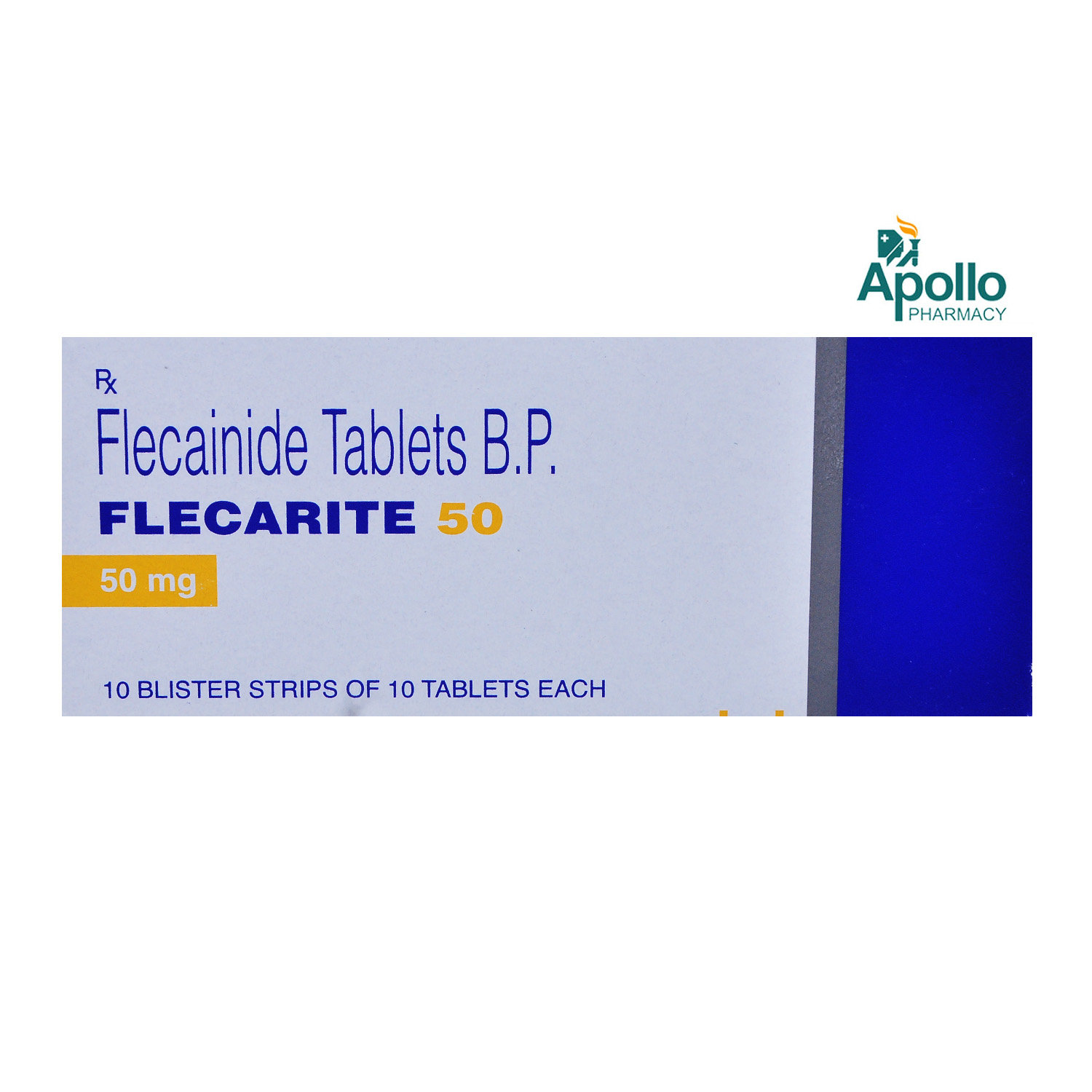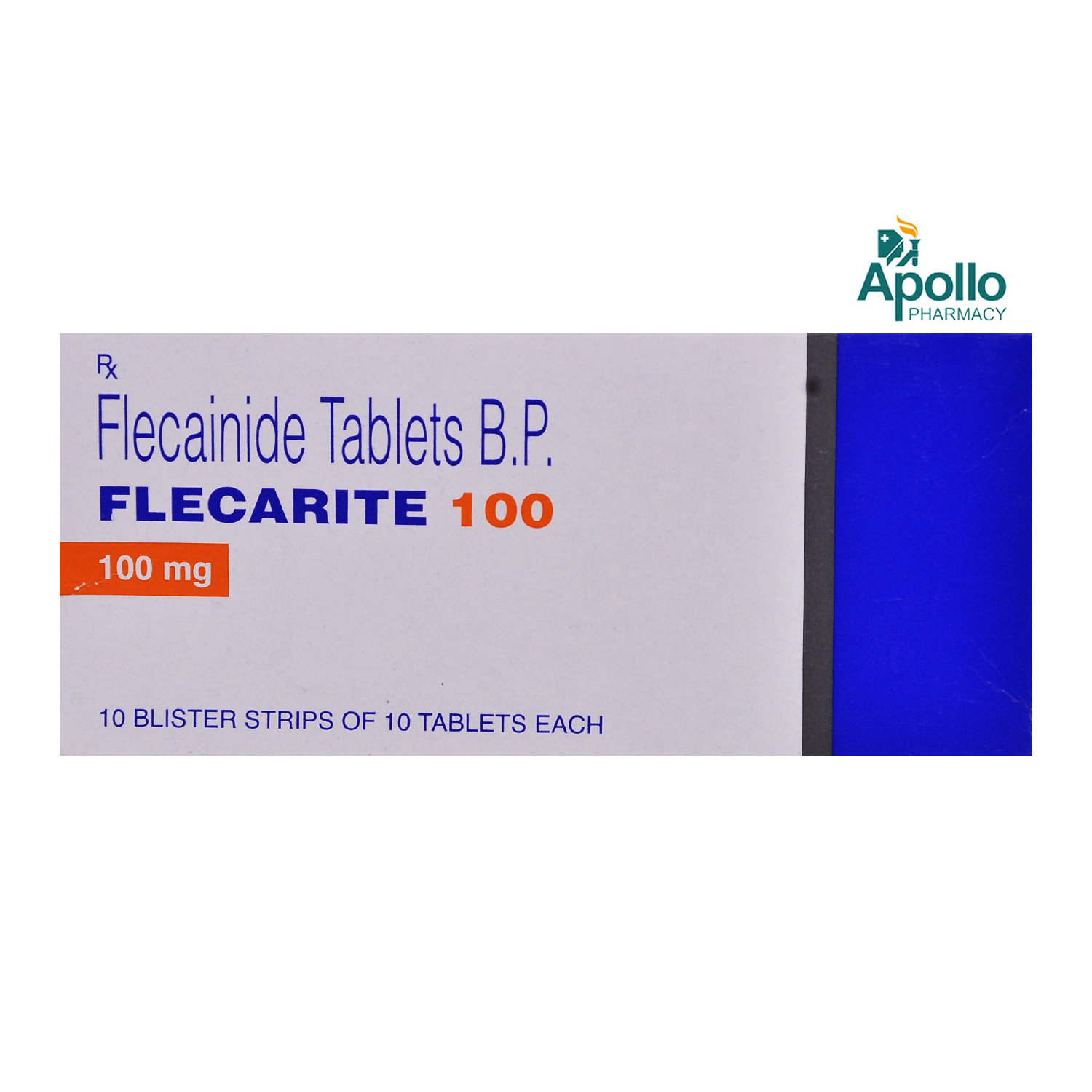Flecainide
About Flecainide
Flecainide belongs to a group of medicines called anti-arrhythmic agents used to treat irregular heartbeats. Irregular heartbeat is a condition in which your heart beats irregularly, too fast or too slow. Flecainide helps slow the heart rate and prevent arrhythmias (abnormal heart rhythms). It is prescribed for patients with ventricular tachycardia, paroxysmal supraventricular tachycardia, atrial fibrillation, or flutter.
Flecainide contains flecainide, which works by restoring the normal heart rhythm by blocking abnormal electrical signals in the heart. This helps to maintain a regular and steady heartbeat.
Some people may experience common side effects like dizziness, blurred vision, breathlessness, arrhythmia (irregular heartbeats), headache, double vision, weakness, fatigue, fever, and oedema (swelling). Most of these side effects of Flecainide do not require medical attention and gradually resolve over time. However, if the side effects persist, please consult your doctor.
If you are known to be allergic to Flecainide or any other medicines, please tell your doctor. Pregnant or breastfeeding women are advised to consult a doctor before taking Flecainide. Inform your doctor before taking Flecainide if you have a pacemaker, scheduled operation, or surgery. Inform your doctor before taking Flecainide if you have an atrial flutter and structural heart disease. Do not take Flecainide if you suffer from a heart rhythm disorder known as Brugada syndrome, reduced or impaired ventricular function, cardiogenic shock, severe bradycardia (less than 50 bpm), severe hypotension, sinus node dysfunction, atrial condition defects, second-degree or greater atrioventricular block, bundle branch block or distal block. Flecainide should be used with caution in hypotension, liver impairment, kidney impairment, and electrolyte abnormalities.
Uses of Flecainide
Medicinal Benefits
Flecainide is an anti-arrhythmic agent that is used to treat irregular heartbeats. It works by restoring the heart rhythm by blocking abnormal electrical signals in the heart. This helps to maintain a regular and steady heartbeat. Flecainide helps treat an irregular heartbeat and can decrease the risk of blood clots; this effect can reduce your risk of heart attack or stroke. Flecainide is also used in the treatment of Wolff-Parkinson-White Syndrome (a syndrome in which an extra electrical pathway in the heart causes a rapid heartbeat).
Directions for Use
Storage
Side Effects of Flecainide
- Dizziness
- Blurred vision
- Arrhythmia (irregular heartbeats)
- Headache
- Palpitations
- Double vision
- Weakness
- Fatigue
- Fever
- Oedema (swelling)
Drug Warnings
If you are known to be allergic to Flecainide or any other medicines, please tell your doctor. Pregnant or breastfeeding women are advised to consult a doctor before taking Flecainide. Inform your doctor before taking Flecainide if you have a pacemaker, scheduled operation, or surgery. Inform your doctor before taking Flecainide if you have an atrial flutter and structural heart disease. Do not take Flecainide if you suffer from a heart rhythm disorder known as Brugada syndrome, reduced or impaired ventricular function, cardiogenic shock, severe bradycardia (less than 50 bpm), or severe hypotension, sinus node dysfunction, atrial condition defects, second degree or greater atrioventricular block, bundle branch block or distal block. Flecainide should be used with caution in hypotension, liver impairment, kidney impairment, and electrolyte abnormalities.
Drug Interactions
Drug-Drug Interactions: Flecainide may have interaction with medicines like anti-viral (atazanavir, indinavir, ritonavir, nelfinavir), anti-seizures (phenytoin, phenobarbitol, carbamazepine), antibiotics (erythromycin, clarithromycin, ciprofloxacin), antifungal (fluconazole) antacids (cimetidine), anti-depressant (escitalopram, Fluoxetine, paroxetine), anti-arrhythmic (amiodarone, dofetilide, pimozide, procainamide, quinidine, sotalol, verapamil), anti-histamines (mizolastine and terfenadine).
Drug-Food Interactions: Flecainide may interact with alcohol. Therefore, avoid alcohol intake while taking Flecainide.
Drug-Disease Interactions: If you have an electrolyte imbalance, cardiac dysfunction, liver disease, renal dysfunction, hypotension, Brugada syndrome, or cardiogenic shock, please inform your doctor before taking Flecainide.
Drug-Drug Interactions Checker List:
Safety Advice

Alcohol
cautionFlecainide may interact with alcohol. Therefore, avoid alcohol intake while taking Flecainide.

Pregnancy
cautionFlecainide is not recommended for use in pregnant women unless necessary. Before taking this medicine, the risks and benefits should be discussed with the doctor.

Breast Feeding
cautionFlecainide is not recommended for use in breastfeeding women unless absolutely necessary. If the medicine is used, close monitoring of the infant for undesired effects is necessary.

Driving
cautionFlecainide may cause symptoms such as dizziness, fainting, blurred vision, and double vision in some patients. You are advised not to perform any activities, such as driving a vehicle or operating machinery, if you experience any of these symptoms during treatment with this medicine.

Liver
cautionFlecainide should be used with extreme caution in patients with liver impairment due to the increased risk of severe adverse effects. Regular monitoring of liver function tests is necessary while receiving this medicine. Appropriate dose adjustments or replacement with a suitable alternative may be required in some cases based on the clinical condition.

Kidney
cautionFlecainide should be used with extreme caution in patients with kidney impairment due to the increased risk of severe adverse effects. Regular monitoring of kidney function tests is necessary while receiving this medicine. Appropriate dose adjustments or replacement with a suitable alternative may be required in some cases based on the clinical condition.

Children
cautionFlecainide may not be recommended in infants (<1 year). But may be used with caution in children by the advice of your doctor. Your doctor will adjust the dose based on the height and weight of the children.
Habit Forming
Diet & Lifestyle Advise
- Maintain a low-salt diet and minimize eating processed foods as they contain more sodium. Try to replace salt with spices or herbs to add flavour to the food.
- Regular exercise lowers blood pressure and keeps blood vessels and the heart in good condition.
- Quit smoking as smoking increases blood pressure and heart rate.
- Eat a balanced and healthy diet that includes plenty of vegetables, fruits, and low-fat or fat-free products.
Special Advise
- Low salt diet and regular exercise are recommended along with Flecainide for effective results.
- Regular electrocardiogram (ECG) should be done to see the effect of Flecainide on your heartbeat.
- Blood tests like sodium and potassium levels, kidney function, and lung function should be checked before starting the treatment with this medicine.
Patients Concern
Disease/Condition Glossary
Arrhythmias: Arrhythmias (irregular heartbeat) is a condition in which your heart beats abnormally, too fast, or too slow. Symptoms of irregular heartbeat include chest pain, shortness of breath, and fast or slow heartbeat. 60 to 100 beats per minute are generally considered a normal heart rate. Pulse indicates your heart rate or the number of times your heart beats in a minute. Normally, the pulse rate increases when you exercise and is slower when you are at rest. Tachycardia is when the heart beats faster than normal, and bradycardia is when the heart beats too slowly. Atrial fibrillation is the most common type of arrhythmia, which causes an irregular and fast heartbeat. Your doctor may run certain tests to diagnose if you have an arrhythmia. Treatment to restore a normal heart rhythm may include medicines like Flecainide, an implantable cardioverter-defibrillator (ICD), a pacemaker, or surgery.
FAQs
Flecainide works by restoring the heart rhythm by blocking abnormal electrical signals in the heart. This helps to maintain a regular and steady heartbeat.
It may take several weeks for Flecainide to show its effect. You are recommended to continue taking Flecainide for as long as your doctor prescribes it, and do not stop taking Flecainide suddenly as it may worsen your heart problems. However, if you experience difficulty while taking Flecainide, please consult your doctor.
You are recommended to avoid taking Flecainide if you have a heart rhythm disorder known as Brugada syndrome, reduced or impaired ventricular function, cardiogenic shock, severe bradycardia (less than 50 bpm), severe hypotension, sinus node dysfunction, atrial condition defects, second degree or greater atrioventricular block, bundle branch block or distal block.
Yes, Flecainide may cause double vision and blurred vision in some people. Therefore, be cautious before driving or using machinery.




